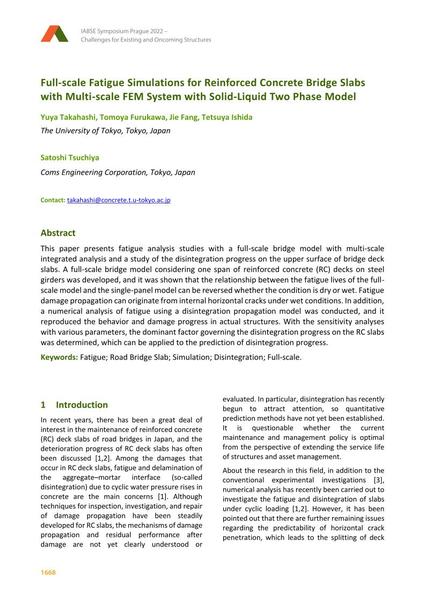Full-scale Fatigue Simulations for Reinforced Concrete Bridge Slabs with Multi-scale FEM System with Solid-Liquid Two Phase Model

|
|
|||||||||||
Détails bibliographiques
| Auteur(s): |
Yuya Takahashi
(The University of Tokyo, Tokyo, Japan)
Tomoya Furukawa (The University of Tokyo, Tokyo, Japan) Jie Fang (The University of Tokyo, Tokyo, Japan) Tetsuya Ishida (The University of Tokyo, Tokyo, Japan) Satoshi Tsuchiya (Coms Engineering Corporation, Tokyo, Japan) |
||||
|---|---|---|---|---|---|
| Médium: | papier de conférence | ||||
| Langue(s): | anglais | ||||
| Conférence: | IABSE Symposium: Challenges for Existing and Oncoming Structures, Prague, Czech Republic, 25-27 May 2022 | ||||
| Publié dans: | IABSE Symposium Prague 2022 | ||||
|
|||||
| Page(s): | 1668-1675 | ||||
| Nombre total de pages (du PDF): | 8 | ||||
| DOI: | 10.2749/prague.2022.1668 | ||||
| Abstrait: |
This paper presents fatigue analysis studies with a full-scale bridge model with multi-scale integrated analysis and a study of the disintegration progress on the upper surface of bridge deck slabs. A full-scale bridge model considering one span of reinforced concrete (RC) decks on steel girders was developed, and it was shown that the relationship between the fatigue lives of the full- scale model and the single-panel model can be reversed whether the condition is dry or wet. Fatigue damage propagation can originate from internal horizontal cracks under wet conditions. In addition, a numerical analysis of fatigue using a disintegration propagation model was conducted, and it reproduced the behavior and damage progress in actual structures. With the sensitivity analyses with various parameters, the dominant factor governing the disintegration progress on the RC slabs was determined, which can be applied to the prediction of disintegration progress. |
||||
| Copyright: | © 2022 International Association for Bridge and Structural Engineering (IABSE) | ||||
| License: | Cette oeuvre ne peut être utilisée sans la permission de l'auteur ou détenteur des droits. |
||||
